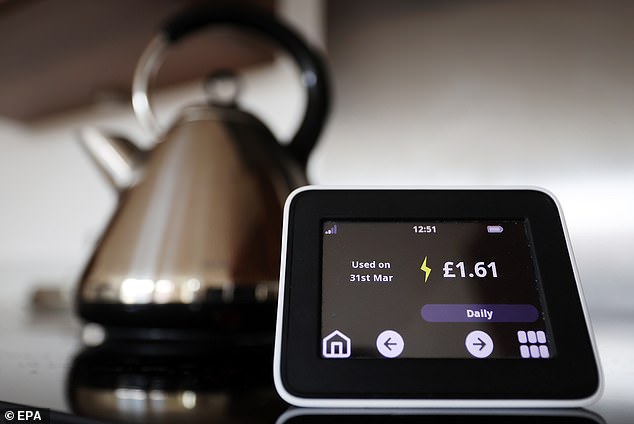For the millions of households stuck with a broken smart meter, last week’s announcement that they could soon be eligible for compensation looks at first like a huge victory.
As the Mail and This is Money revealed last week on broken smart meter payouts, the energy regulator Ofgem has proposed that any household with a smart meter that does not operate correctly should be paid £40 compensation if their energy supplier doesn’t fix it within 90 days.
If the rules were introduced today, households would rake in a mammoth £143 million in compensation.
And that was just one of four proposals put forward by Ofgem to give households greater protection when something goes wrong with their smart meter.
The announcement came after Money Mail reported that soaring numbers of households are stuck with ‘dumb’ smart meters that no longer work properly.
We warned for months that suppliers need to be forced to fix the broken devices – or else risk undermining the nationwide rollout.

Infuriating: Soaring numbers of households are stuck with ‘dumb’ smart meters that no longer work properly
The scale of the problem is so bad that as many as one in ten smart meters are not working correctly – more than 3.5 million, according to the latest official figures.
But study the proposals more closely and all is not what it at first seems. Here, Money Mail digs into the detail to find out what help you can really expect if you have a broken smart meter…
What is the problem now?
The Government has a grand plan to switch all the traditional energy meters in Great Britain to smart ones, which automatically tell your supplier how much gas and electricity you have used.
The idea is that it should eliminate the need to take meter readings – and allow you to take greater control of your consumption once you can see how much you’re spending in real time.
Energy suppliers have been tasked with getting smart meters into 75 pc of homes by the end of the year.
The initial plan was that everyone should have one by 2019, but the rollout has been so riddled with complications, delays and incompetence that the target has been pushed back further and further.
Energy suppliers face fines if they do not install enough, so they have been deploying every tactic they can think of to hit their targets – from telling households they must have one installed (they don’t) to telling them their old one has ‘expired’ (even when they haven’t).
What they are not incentivised to do is fix meters that have been installed and are now broken.
So it is perhaps no surprise that energy suppliers are steamrolling ahead trying to get new smart meters into as many homes as possible while frequently ignoring customers who complain that their existing one does not work.
Money Mail has heard from scores of readers in this position – many of whom have received incorrect bills caused by faulty smart meters or been left for months with meters that do not work.
The problems are also putting off households considering switching to a smart meter. After all, it doesn’t exactly fill you with confidence to know there are some 3.5 million broken ones out there.
So how will this all be fixed?
Last week, the regulator Ofgem came out fighting, finally promising to stand up for households with smart meter problems that have been dismissed and ignored.
‘We’re drawing the line on excuses,’ said Tim Jarvis, director general for markets at Ofgem. ‘Suppliers will need to follow our new rules or compensate their customers.’
Strong words – and about time. After all, Ofgem has fined six of the UK’s biggest energy firms
£10.8 million for missing smart meter installation targets. But it has not issued so much as a slap on the wrist to suppliers that take months to fix broken ones.
Is it all talk – or backed up by strong action? Let’s unpick Ofgem’s four proposed improvements.
1. Compensation for smart meters not operating in smart mode if not fixed within 90 days.
The compensation would amount to £40 – or £80 if both their gas and electricity meters did not work.
The good news is that households would not have to apply for the compensation.
There is already a mechanism through which energy firms automatically make payouts if they fail their customers in other ways, such as if they do not keep an appointment or if they take longer than five days to action a household’s request to switch supplier.
This system, called the Guaranteed Standards of Performance, would be rolled out to cover problems with smart meters as well.
Once your supplier has agreed to pay you compensation, it would have ten days to do so – or else face another £40 fine. That should light the fire under sluggish ones.
Now for the bad news. Firstly, it could be months until the rules come into force. They are part of an ‘initial consultation’.
Ofgem is asking for views from interested parties on the proposals. And no doubt energy suppliers will have a thing or two to say about them.
The regulator says households are welcome to respond as well – but that the more feedback it gets, the longer it may take to evaluate it.
That consultation closes on May 9. Next comes the ‘statutory consultation’. After that, there will be a decision and then implementation.
Ofgem says it does not know how long all this will take. As an example, a recent consultation into increasing levels of compensation paid from £30 to £40 took as long as eight months – and that was a considerably more straightforward proposal than these smart meter ones.
Ofgem says it is likely the clock will start ticking on the 90 days when the new rules are introduced – which would mean households that already have broken meters may have to wait a further three months to get compensation.
However, households may wish to keep hold of any evidence that shows they have had a broken smart meter for more than three months already in case allowances are made for them in the new rules.
All told, it looks very unlikely that anyone would see a penny of compensation before 2026.
Secondly, the compensation applies only to smart meters that have gone ‘dumb’. In other words, ones that are no longer communicating with the energy supplier. It does not cover complications such as if your smart meter display is no longer working.
2. Customers requesting a new meter should be offered an appointment within six weeks.
This may sound promising but, in reality, it’s solving a problem that is practically non-existent.
Suppliers are champing at the bit to install smart meters to reduce their risk of getting a fine for missing their target. If households actually want and request one, few are likely to be left waiting for long.
3. Quicker fixes if a customer reports a problem with their smart meter, requiring suppliers to provide a resolution plan within five working days of the report.
A quick fix sounds great, but all that suppliers are required to do within five days is provide a ‘resolution plan’.
In other words, set out what they plan to do to fix it. But no deadline is being promised for them to actually sort the problem. Ofgem says it is considering issuing guidance on what constitutes appropriate action.
4. Compensation for a failed smart meter installation because of a fault within the supplier’s control.
In theory, this looks like a strong guarantee. Ofgem says it would expect suppliers to pay compensation within ten days of the failed installation.
The question is whether suppliers find ways to wriggle out of paying by suggesting failures were out of their control.

Payouts: Ofgem has proposed that any household with a broken smart meter should be paid £40 compensation if their supplier doesn’t fix it within 90 days
What is missing from the plan?
Even if these four measures are introduced in full and soon, critics suggest they still won’t fix the problem of broken smart meters.
Consumer charity Citizens Advice says Ofgem must also reduce back-billing times for smart meter holders.
At the moment, if you underpay for your energy because a fault with your smart meter means you are undercharged, your supplier can issue you with a ‘catch-up’ bill for the shortfall going back a maximum of 12 months.
Debts older than this must be written off. Citizens Advice is among those calling for the period to be reduced for smart meter holders.
Alex Belsham-Harris, head of energy policy at Citizens Advice, says: ‘Ofgem’s proposed new rules are welcome.
‘They should reduce the number of people having issues with their smart meter, with automatic compensation if standards aren’t met. It must now reduce the period smart meter users can be charged retrospectively, to help guarantee more accurate bills.’
How to get your meter sorted out
If your smart meter isn’t working, talk to your supplier – it is responsible for fixing it.
If your smart meter is not communicating properly with your supplier, your bill may be based on estimates rather than correct figures for how much you have used.
Citizens Advice suggests that you look for the letter ‘E’ on your latest bill, which indicates that an estimate has been used.
If your supplier tries to back-bill you for energy you used over a year ago, don’t put up with it. It can’t do this if it is at fault for not sending accurate bills. Ask your supplier to wipe the debt.
If your dispute is not resolved, you may be able to seek help from the Energy Ombudsman. Go to energyombudsman.org.
moneymail@dailymail.co.uk
Some links in this article may be affiliate links. If you click on them we may earn a small commission. That helps us fund This Is Money, and keep it free to use. We do not write articles to promote products. We do not allow any commercial relationship to affect our editorial independence.







